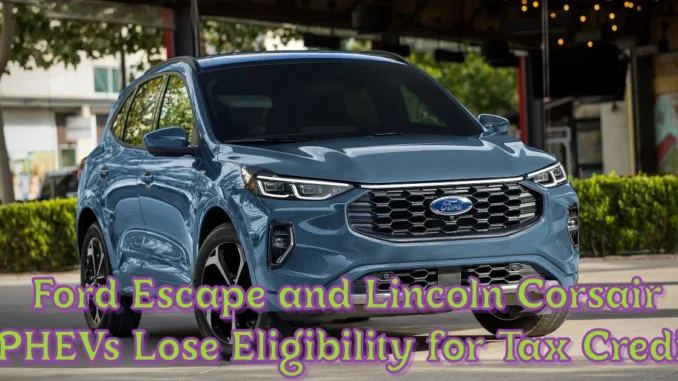
At the start of 2024, several all-electric vehicles and plug-in hybrids lost their eligibility for the federal tax credit, which can provide up to $7,500 in incentives. This shift was due to stricter sourcing requirements for batteries and raw materials introduced at that time. Among the affected vehicles were models from Ford, including the Escape PHEV and Lincoln Corsair Grand Touring. Initially, these two vehicles still qualified for a partial federal tax credit of $3,750. However, as of January 1, 2025, this is no longer the case.
Table of Contents
What Happened to the Tax Credit Eligibility?
According to a dealer bulletin reported by CarsDirect, the Ford Escape PHEV and Lincoln Corsair Grand Touring both lost their eligibility for the federal clean energy tax credit starting in 2025. The IRS bases eligibility on the date the vehicle is “placed in service,” meaning this change impacts both 2025 model year vehicles and any unsold 2024 models still in dealerships.
Interestingly, Ford has not disclosed specific reasons why these vehicles are no longer eligible for the tax credit. However, this development significantly affects affordability for buyers who would otherwise have benefited from these federal incentives.
Higher Costs for Buyers, But Leasing Incentives Remain
With the federal tax credit no longer available, the Ford Escape PHEV and Lincoln Corsair Grand Touring now come with higher price tags for buyers. Despite this setback, leasing incentives may provide some financial relief.
According to CarsDirect:
- The 2024 Ford Escape PHEV offers a $4,750 lease incentive through Ford Credit.
- The 2024 Lincoln Corsair Grand Touring provides up to $4,250 off sticker price for lessees.
These incentives could make leasing a more attractive option for shoppers interested in these models.
IRS Changes in 2025 Could Increase Paychecks and Reduce Taxes
Who’s Exempt? The Complete Guide to FICA Tax and Who Won’t Pay It in 2025
Is 2025 the End of Daylight Saving Time in the United States?
The Future of Federal Clean Energy Tax Credits
Adding further uncertainty to the situation, the future of the federal clean energy tax credit itself is in question. Incoming President Donald Trump has long been rumored to be considering eliminating this program altogether.
Ford-backed lobby group Alliance for Automotive Innovation (AAI) recently sent a letter urging the president to reconsider ending the tax credit. Meanwhile, Ford CEO Jim Farley expressed uncertainty about the outcome, especially regarding the influence of Tesla CEO Elon Musk, a close adviser to Trump. Farley remarked, “I don’t know how to handicap that. We’re just focusing on us.”
Kia EV9 Recall Alert: Missing Seat Mounting Bolts Could Compromise Passenger Safety
Ford Recalls Nearly 300,000 F-Series Trucks Over Fuel Pump Defect: Everything You Need to Know
Find Out How You Can Qualify for Up to $2,000 in IRS Tax Credits
What This Means for EV and PHEV Shoppers
If the federal clean energy tax credit is eliminated, it could reshape the market for electric and plug-in hybrid vehicles, making affordability a larger concern for consumers. For now, shoppers interested in the Ford Escape PHEV or Lincoln Corsair Grand Touring can still explore leasing incentives as a way to offset costs.
As the EV market continues to evolve, staying informed about tax credit changes and manufacturer incentives will be essential for making cost-effective decisions.
Leave a Reply